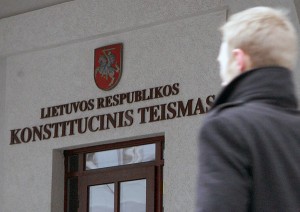- February 13, 2014
- 237
Surnames – norm in Europe, in Latvia… against the Constitution

The Constitutional Court is again about to state if Lithuanian Poles are allowed to use their Polish surnames or if they will be still forced to use their lithuanianized version. Government’s previous interpretation of the court’s opinions was unfavorable to the expectations of Polish minority.
This time the issue concerns the dispute between the Ministry of Justice, which is working on a project of a legal government regulation for spelling non-Lithuanian surnames, and the State Commission of the Lithuanian Language. The Ministry believes that the Commission can initiate changes in the legal regulation for spelling non-Lithuanian surnames, specifying to what extend (if) non-Lithuanian surnames are a part of the Lithuanian language. The Ministry claims that it has nothing to say about this matter because everything has been said in the previous opinion of the Constitutional Court concerning the spelling of non-Lithuanian surnames.
It concerns the decision of the Constitutional Court from October 21th, 1999. As it was stated, since Lithuanian is the state language, all of the citizen’s ID inscriptions, including the name and the surname, have to be written in accordance to the requirements of the state language. Otherwise, according to the Constitutional Court, it would undermine the status of Lithuanian as a state language. In connection with this decision the Ministry of Justice asks the Court for a legal clarification if the language commission is a proper institution to initiate a legal change of spelling non-Lithuanian surnames.
Yesterday, on February 13th, the Constitutional Court had listened to the arguments of both parties.
Yesterday the deputy Minister Paulius Griciūnas explained in the court that the State Commission of the Lithuanian Language allows non-Lithuanian surnames to be written in their original form in the State Record or in documents from the Migration Office (e.g. in permanent residence cards for foreigners, which replace Lithuanian IDs, the so-called ID cards). However, the Commission claims that because of the Court’s interpretation it cannot propose a similar solution concerning non-Lithuanian surnames in Lithuanian IDs.
According to the deputy Minister, the Commission is the one competent institution which can specify to what extend non-Lithuanian surnames are a part of Lithuanian and propose a legal regulation that would be adequate for these establishments.
The Commission, however, does not want to be involved in the issue of non-Lithuanian surnames and their spelling. Its members think that this issue is within political and legal regulations, and the ability to determine legal regulations for spelling surnames in documents is beyond the Commission’s competences.
‘There are laws that regulate it,’ firmly responds the Commission of the Lithuanian Language.
Spelling of non-Lithuanian surnames is a problem not only for the Polish minority, but it also concerns multitude Lithuanian emigrants who marry foreigners. According to the current Lithuanian laws, spelling of their surnames may be significantly different from the one of their partner.
In most EU countries, like in Lithuania, the Constitution decides upon the status of the state language. However, in the EU, unlike in Lithuania, the regulation of spelling surnames is not treated as breaking the fundamental law.
Stanisław Tarasiewicz
Right to use the language of national minorities is an issue of interpretation
European Foundation of Human Rights (EFHR) emphasizes that a possibility to use the language of minorities in public life depends on the interpretation. The Constitution of Lithuania only states that Lithuanian is the state language. The Constitution does not include the prohibition of introducing an auxiliary language and it does not forbid spelling names and surnames in their original form. The assumption that using a different language and not the national one is contrary to the Constitution and it is based only on the interpretation of the Constitutional Court.
In the European Union countries, the establishment of a state language does not prohibit using other languages in public life, on the contrary – a state language only obliges state offices to provide services using the state language, but by no means does it forbid using other languages.
The possibility to write names and surnames in their original form, as well as the possession of bilingual sings remains an issue of interpretation, lack of clear regulations and politics. EFHR had been repeatedly drawing attention of the society to the international criticism on Lithuania based on the claim that it does not follow the Framework Convention for the Protection of National Minorities. In the resolution for implementing Framework Convention for the Protection of National Minorities, the Committee of Ministers criticizes the judgments of Lithuanian courts for not taking the settlements of Framework Convention into consideration. They also notice the lack of clear and coherent legal regulations concerning the protection of national minorities in Lithuania.
EFHR, taking into consideration current international regulations and existing national laws, stresses that establishment of the national language cannot foster discrimination or the restriction of the rights of national minorities.
EFHR also reminds about the leaflet ‘Don’t hesitate to speak your mother tongue’ (http://www.efhr.eu/ulotki_efhr/jezykowa_PL.pdf), which presents examples of formal situations in which people can talk in their mother tongue, i.a. in state institutions or in court. No legal regulations allowing the use of mother tongue that are mentioned in the leaflet were considered contrary to the Lithuanian Constitution. A similar example is the decision of the State Commission of the Lithuanian Language from November 8th, 2012, in which the Commission allowed advertising in other languages next to the inscriptions in the state language to provide international communication. Given examples show that languages of national minorities and foreign languages are being used in Lithuania every day and they are no threat for the Lithuanian language.
European Foundation of Human Rights
Source: http://kurierwilenski.lt/2014/02/13/nazwiska-w-europie-norma-na-litwie-wbrew-konstytucji/
Tłumaczenie by Anna Leśkiewicz w ramach praktyk w Europejskiej Fundacji Praw Człowieka, www.efhr.eu. Translated by Anna Leśkiewicz within the framework of a traineeship programme of the European Foundation of Human Rights, www.efhr.eu.

